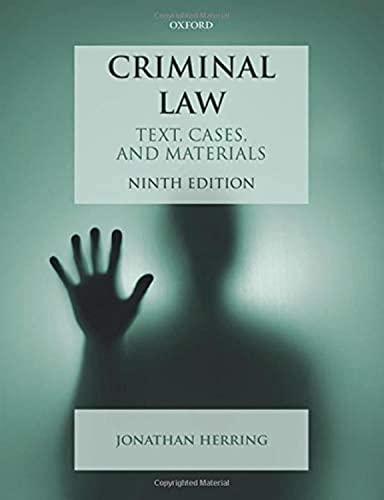Question
A. Questions your tutor will ask people to answer individually to the larger group: 1. Mabo v Queensland How did Britain acquire sovereignty over the
A. Questions your tutor will ask people to answer individually to the larger group:
1. Mabo v Queensland
- How did Britain acquire sovereignty over the Merriam Islands? Was this challenged by the plaintiffs, and could it be challenged?
- What are the three classifications for colonies in international law and what are the domestic legal consequences that flow from each of those classifications?
- Why was Australia classified as a 'settled' colony, what difficulty did this present the High Court and how was this resolved?
- What is radical title?
- How is the content of native title defined?
- How can native title be lost or extinguished?
- Can the Crown make a land grant that is inconsistent with an earlier land grant?
- Did the court find that compensation was payable for the extinguishment of native title? What is the relevance of theRacial Discrimination Act 1975(Cth) in Mason CJ and McHugh J's judgment?
2. How does the Native Title Act define native title?
3. Explain the High Court decision in Wik v Queensland and its significance for Indigenous communities and farmers.
4. What did the High Court decide in Brown and Akiba?
B. Problem question for small group deliberation and discussion
ThePublic Health and Safety Act 1915(Cth) enables the Australian government, by regulation, to 'acquire exclusive control of land for a period of up to 12 months where necessary to prevent or restrict the outbreak of a disease that poses a threat to public health, including diseases affecting animals and livestock'. The Act requires that landowners who are affected by such an acquisition be paid compensation.
In 1945, there was an outbreak of a highly infectious disease on a farm in far western New South Wales. The disease can remain latent in the soil for up to 8 months even after it has been eradicated from livestock. The Australian government passed regulations acquiring possession of the farm and all land within a 4 kilometre radius for a period of 12 months. It paid compensation to all private landowners who were affected. It also installed a 3 metre security fence around the land it had acquired to prevent any person from entering.
Part of the land affected by the acquisition was an Aboriginal reserve called Mount Nancy. Mount Nancy had been established in 1862 as a place for Aboriginal people from the region. It was situated on Crown land and managed by the government of New South Wales. When the land was acquired in 1945, the Aboriginal people who lived on Mount Nancy were moved 80 kilometres to a different Aboriginal reserve. The government then removed all of the buildings on Mount Nancy.
After 12 months had passed the government conducted tests and the land was found to be free from disease. The fence was removed and the government allowed most people to return to their land, however it closed down the Mount Nancy Aboriginal Reserve and told the former residents that they were not allowed to return. The government then granted a 99 year grazing licence over the Mount Nancy land to one of the neighbouring farmers, Polly Hill. The grazing licence gave Polly 'the exclusive right to run sheep and cattle on the land', in return for an annual fee, but reserved the right of any person to 'pass and repass over the land or to access the land for any purpose other than to depasture stock'. Polly built a cattle crush on the land, as well as a small cottage. Polly died in 1980 and her real property was inherited by her son Mike. Mike still runs cattle on the land, but lives in town. The cottage on the grazing licence land has been uninhabited for decades.
Husband and wife, Russell and Collette Bradfield, are both Aboriginal descendants of the former residents of Mount Nancy Reserve. Russell spent all of this teenage years at boarding school in Sydney, but has been actively involved in the local indigenous community since his return at age 18. He is on the board of the local Indigenous pre-school, which teaches in the local language. In their early childhoods, both Russell and Collette were regularly taken on hunting and river fishing trips by their parents and grandparents, and were taught traditional skills and knowledge. The extended family hunted on land within roughly 100 km radius of Mount Nancy and fished for both native and non-native fish in the local river system. The local river is full of non-native carp, which recreational fishers generally avoid because of its muddy taste. However, the new chef at the local 'farm to fork' restaurant has the skills to properly prepare carp and asks Collette if she can catch and sell him some. Under theFisheries Management Act 1994(NSW), all commercial and recreational fishing in NSW requires a licence, with the exception of recreational fishers who are under 18, hold a pension or veterans affairs card or are Indigenous.
Russell and Collette are keen to formalise their rights to access their traditional land. Identify and discuss any issues that might be relevant to a native title claim.
Step by Step Solution
There are 3 Steps involved in it
Step: 1

Get Instant Access to Expert-Tailored Solutions
See step-by-step solutions with expert insights and AI powered tools for academic success
Step: 2

Step: 3

Ace Your Homework with AI
Get the answers you need in no time with our AI-driven, step-by-step assistance
Get Started


